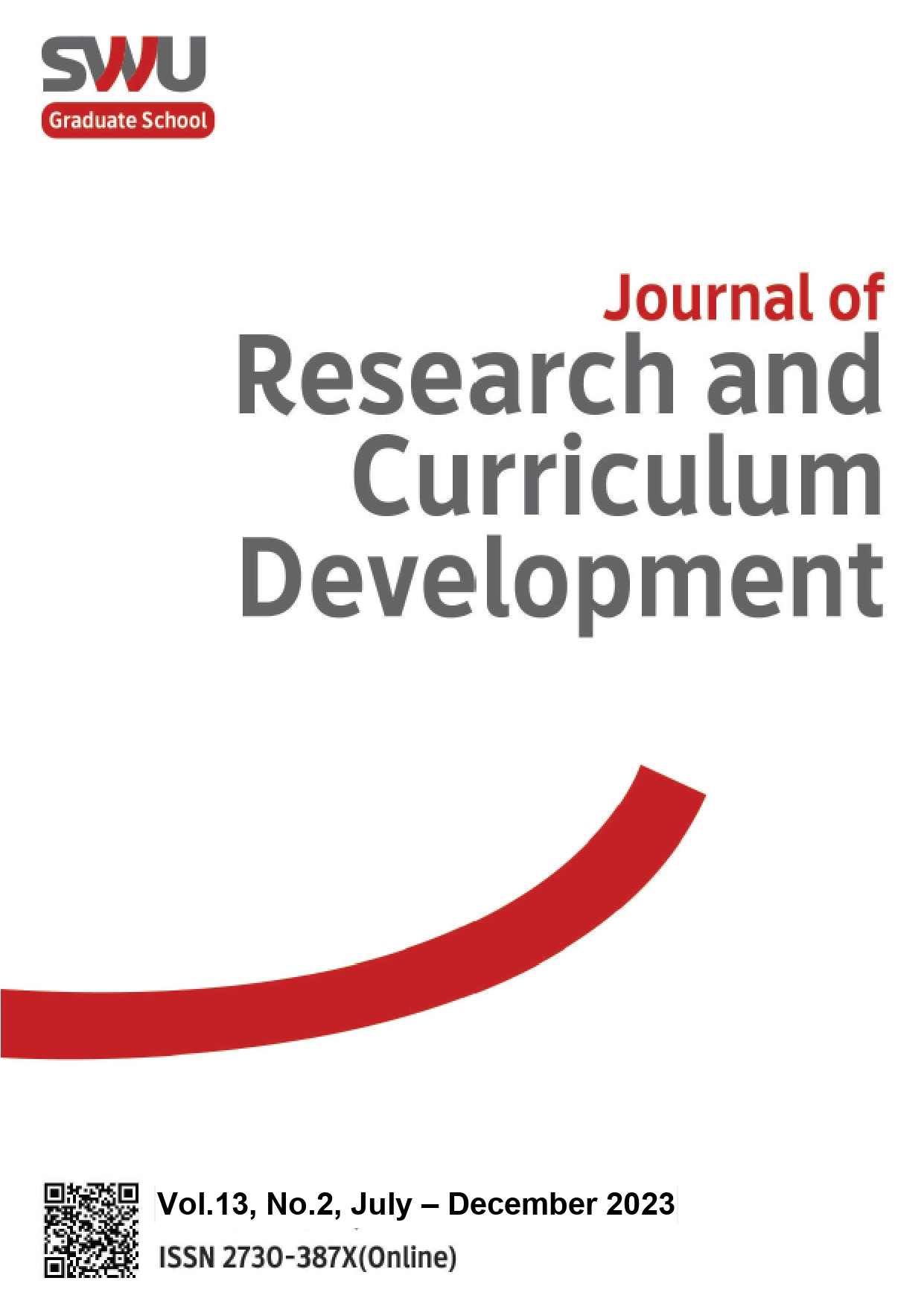Effect of Reflection on Analytical and Critical Thinking Skills for Engineering and Technology Students: A Case Study in a General Education Class
Keywords:
Analytical thinking, Critical thinking, Reflection skill, Teacher as a coach, Three-basket techniqueAbstract
This pilot study aimed to investigate the effect of student’s learning-reflection skill as a mediator on the thinking skills of participants taking a subject, Learning and Problem-Solving Skills. The course covered analytical thinking skills and critical thinking skills. Throughout the 15-week semester, the practice of reflection using the 3-basket technique was implemented. Using the coaching competency, the instructor created an environment in which students could safely reflect on their learning as a group or individually. At the end of the semester, the perception of the students’ thinking and learning abilities, i.e., analytical thinking and critical thinking, and reflection skills were evaluated and correlated with the predictors such as the class satisfaction in terms of the structure/activities, the instructor’s behavior/in-class environment, and the students’ behaviors. The results showed strong positive correlations of the predictors with the students’ reflection and thinking skills. In addition, both instructor’s behavior as coach/in-class environment and students’ behaviors significantly effected students’ thinking abilities via students’ reflection skills as the mediator.
References
Abdullah, H., Mohd Nizah, M. A., & Baharun, H. (2012). Promoting Thinking Skills: An Evaulation of Effectiveness of Invention Project. Elixir Social Studies, 44, 7178-7187.
Baron, R. M., & Kenny, D. A. (1986). The moderator–mediator variable distinction in social psychological research: Conceptual, strategic, and statistical considerations. Journal of Personality and Social Psychology, 51, 1173-1182. https://doi.org/10.1037/0022-3514.51.6.1173
Becker, J. M. (1996). Peer coaching for improvement of teaching and learning. (Online) http://teachersnetwork.org/tnli/research/growth/becker.htm, Retrieved September 30, 2023.
Chaplin, S. (2007). A model of student success: Coaching students to develop critical thinking skills in Introductory Biology courses. International Journal for the scholarship of teaching and learning, 1(2), n2.
Cimermanová, I. (2018). The Effect of Learning Styles on Academic Achievement in Different Forms of Teaching. International Journal of Instruction, 11(3), 219-232. https://eric.ed.gov/?id=EJ1183439
Gibbs, G. (1988). Learning by doing: A guide to teaching and learning methods. Further Education Unit.
Hazlina, A. (2020). Exploring Factor Structures Of A Thinking Questionnaire. Ulum Islamiyyah, 31, 35-53. https://doi.org/10.33102/uij.vol31no.199
Heo, D., Anwar, S., & Menekse, M. (2018). The relationship between engineering students’ achievement goals, reflection behaviors, and learning outcomes. International Journal of Engineering Education, 34(5), 1634-1643.
Holley, L. C., & Steiner, S. (2005). Safe space: Student perspectives on classroom environment. Journal of Social Work Education, 41(1), 49-64.
İlçin, N., Tomruk, M., Yeşilyaprak, S. S., Karadibak, D., & Savcı, S. (2018). The relationship between learning styles and academic performance in TURKISH physiotherapy students. BMC Medical Education, 18(1), 291. https://doi.org/10.1186/s12909-018-1400-2
Jutarosaga, M. (2019). Developing Creative Systems Thinking Processes: A Refection of Thinking Through Three- Basket Technique. Journal of Research and Curriculum Development, 9(2), 203-222. https://so03.tci-thaijo.org/index.php/jrcd/article/view/216950
Jutarosaga, M. M., Tiwa; Somtua, Niramol; Komaratat, Sirima; Sansuk, Juree; Chanaboon, Atchara; Jutarosaga, Anittha. (2021). Effect of the humanizes health care development with simulated family system on systematic creative thinking skills with three baskets technique among health care personnel. Journal of Research and Curriculum Development, 11(1), 49-70.
KMUTT Student QF. (2016). https://www.c4ed.kmutt.ac.th/qf-2
Kolb, D. (1984). Experiential Learning: Experience As The Source Of Learning And Development (Vol. 1).
Luecha, W., Pratumtin, A., Gomaratus, S., Pinprasong, N., Wannuruk, S., & Sunato, P. (2022). Effects of the Humanized Health Care Learning Process Development using a Simulated Family System on Creative Systematic Thinking Process through a Three-Basket Technique of Caring Team Leaders in Chaiyaphum Hospital. Nursing Journal of The Ministry of Public Health, 32(3), 109-121.
Martin, F., & Ertzberger, J. (2016). Effects of reflection type in the here and now mobile learning environment. British Journal of Educational Technology, 47(5), 932-944. https://doi.org/https://doi.org/10.1111/bjet.12327
Martin, F. B., Doris U. (2018). Engagement Matters: Student Perceptions on the Importance of Engagement Strategies in the Online Learning Environment. Online Learning, 22(1), 205-222. https://eric.ed.gov/?id=EJ1179659
Moore, M. G. (1989). Editorial: Three types of interaction. American Journal of Distance Education, 3(2), 1-7. https://doi.org/10.1080/08923648909526659
Preacher, K. J., & Leonardelli, G. J. (2010). Calculation for the Sobel test. (Online) https://quantpsy.org/sobel/sobel.htm, Retrieved September 30, 2023.
Ridley, D. S., Schutz, P. A., Glanz, R. S., & Weinstein, C. E. (1992). Self-regulated learning: The interactive influence of metacognitive awareness and goal-setting. The journal of experimental education, 60(4), 293-306.
Rock, D. (2006). Quiet leadership : help people think better -- don't tell them what to do : six steps to transforming performance at work (1st ed.). Collins.
Sobel, M. E. (1982). Asymptotic Confidence Intervals for Indirect Effects in Structural Equation Models. Sociological Methodology, 13, 290-312. https://doi.org/10.2307/270723
Tan, G. Y. H. (2001). Analysis and evaluation of the Thinking Programme in developing critical and creative thinking among lower secondary students in The Chinese High School AARE Annual Conference, Fremantile. https://www.aare.edu.au/publications/aare-conference-papers/show/3309/analysis-and-evaluation-of-the-thinking-programme-in-developing-critical-and-creative-thinking-among-lower-secondary-students-in-the-chinese-high-school
Tang, T., Abuhmaid, A. M., Olaimat, M., Oudat, D. M., Aldhaeebi, M., & Bamanger, E. (2020). Efficiency of flipped classroom with online-based teaching under COVID-19. Interactive Learning Environments, 1-12. https://doi.org/10.1080/10494820.2020.1817761
Thamsaeng, A. (2020). Evaluation of teaching and learning of communicable and non-communicable diseases course By using 3 basket techniques of students in the Bachelor of Public Health program Community Health Program Sirindhorn College of Public Health Khon Kaen Province. Research and Development Health System Journal, 13(1), p287-291.
Wongyai, W. P., Marut. (2015). Cognitive Coaching. Charansanitwong Printing Co., Ltd.
Wongyai, W. P., Marut; Intalapaporn, Chamras. (2018). Developing the Analytical Thinking of Teachers Students by Collaborative Coaching Approach. Veridian E-Journal, Silpakorn University (Humanities, Social Sciences and arts), 11(2).
Yu, L., Shek, D. T. L., & Zhu, X. (2018). The Influence of Personal Well-Being on Learning Achievement in University Students Over Time: Mediating or Moderating Effects of Internal and External University Engagement [Original Research]. Frontiers in Psychology, 8. https://doi.org/10.3389/fpsyg.2017.02287
Zhao, Y., & Watterston, J. (2021). The changes we need: Education post COVID-19. Journal of Educational Change, 22(1), 3-12. https://doi.org/10.1007/s10833-021-09417-3
Downloads
Published
How to Cite
Issue
Section
License

This work is licensed under a Creative Commons Attribution-NonCommercial-NoDerivatives 4.0 International License.


